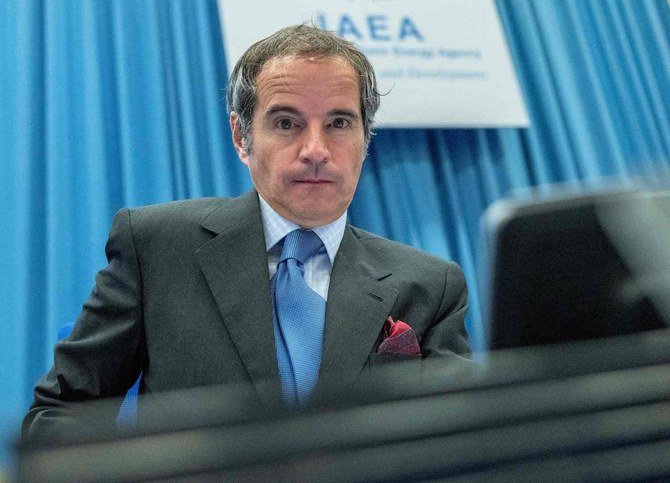
- ARAB NEWS
- 15 Jul 2025

Memories of a bungled exit from Afghanistan will cast a long shadow over America’s intentions in a region it has emphatically demonstrated it wants to depart from, and with haste.
What remains for the Biden White House is to rationalize a dwindling US presence in the Middle East, and tofocus on the last piece of unfinished business — negotiating Iran’s return to compliance with the flawed Joint Comprehensive Plan of Action, the 2015 agreement to curb Tehran’s nuclear program in return for the lifting of sanctions.
If the Afghanistan debacle and the end of the US combat mission in Iraq are anything to go by, an increasingly distant Washington may be amenable to accepting the previously unthinkable while it pivots east or focuses on domestic priorities.
Even a cursory examination of what happened in Afghanistan reveals parallels with Iran’s behavior before the resumption of talks in Vienna.
Before August, the Taliban insisted to their interlocutors in Doha that they were committed to a peaceful settlement, even as their fighters were capturing province after province, edging ever closer to Kabul. Iran, meanwhile, claims to be eager to resume talks, and insists that it will abide by the nuclear deal’s provisions in hopes of obtaining sanctions relief for its battered economy and exasperated populace.
However, last week the UN’s nuclear watchdog, the International Atomic Energy Agency, released two confidential reports confirming that Iran had moved even farther away from the nuclear deal — having enriched about 10kg of uranium to a purity level just 27 percent shy of weapons grade. Furthermore, Iran’s repeated refusal to allow access to nuclear sites has made surveillance footage of these sites crucial. However, some of the equipment meant to capture that footage has been damaged or destroyed, so the IAEA does not know the current locations of Iran’s fissile material. These developments complicate already fragile efforts to persuade Tehran to curb its ambitions.
The US and its European allies were cautiously optimistic in the early stages of the Vienna talks, believing a return to compliance was within reach. Unfortunately, these hopes have been rewarded by open defiance. It is as if Tehran is daring the US and the global superpowers that comprise the P5+1 to act, knowing full well that the White House is desperate for any foreign policy victory after the woeful Afghanistan exit, and before next year’s midterm elections.
Tehran sees an opportunity to persist with a nuclear program that has survived several sanctions regimes and is on pace to achieve weapon breakout in a matter of weeks.
Hafed Al-Ghwell
Dysfunction, partisanship, and a deeply polarized public now weigh heavily on any US foreign policy determinations. Most Americans share a zero-tolerance policy for terrorism and a lack of appetite for nationbuilding. The natural consequence of that is a White House doggedly revisiting its commitments, especially in the Middle East and North Africa, preferring a role as a facilitator rather than an instigator.
The days of an enduring American presence are gone. In its place is an indeterminate approach, far more responsive to America’s need to disentangle itself. In that light, perhaps Tehran sees an opportunity to persist with a nuclear program that has survived several sanctions regimes and is on pace to achieve weaponbreakout in a matter of weeks. After all, there is now considerably less potential for a decisive US response ifthe Vienna talks fall apart or Tehran detonates its first nuclear weapon.
To the hard-liners who supplanted the moderates in the Iranian presidential election, there is no greater prize than having a mature program capable of producing large quantities of fissile material for nuclear weapons,even if the price is stiffer sanctions or pariah status. Iran is already an influential regional player, and will survive internationally with the help of its ties to Moscow and Beijing.
The latest IAEA revelations are a test for the Biden administration’s intentions, and those of its European allies. Formally rebuking Iran risks scuttling any progress made in Vienna, but remaining silent will undermine theauthority of the UN nuclear watchdog — the very same body entrusted with policing a revived nuclear deal.
Early responses from officials involved in the Vienna talks suggest that a resolution condemning Iran’s defiance is inevitable. Tehran has threatened that such a condemnation will disrupt negotiations in Vienna, which they predict will take up to three more months.
For the rest of the P5+1, the IAEA’s revelations have made the continuation of talks even more uncertain. If a rebuke does indeed lead to Iran threatening to back out, there is little assurance that America, fixated on exiting the region, will not just lunge for a toothless new agreement that will do nothing to stop the nuclearization of the Middle East.